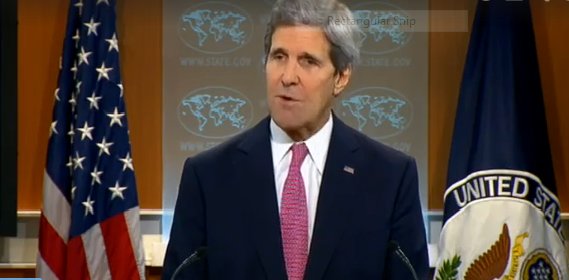In its annual human rights report released on Thursday, the US State Department noted marked decreases in abuses such as torture, disappearances and forced portering committed by Burmese government forces.
It also identified political prisoners, humanitarian access, and combatting corruption as areas where improvements had been made under the Thein Sein government.
“During the year [2013] the government’s human rights record continued to improve, although authorities had not fully or consistently implemented legal and policy revisions at all levels, particularly in ethnic minority areas,” the report read. “Observers reported marked decreases in systemic human rights abuses committed by the government, such as torture, disappearances, and the forced use of civilians to carry military supplies in some ethnic border areas.”
US Secretary of State said that Burma was “slowly moving away – not just from dictatorship – but towards a more productive partnering with the United States and the international community.”
With regard to political prisoners, the US statement noted that on 6 February 2013, President Thein Sein announced the formation of a committee to identify and release political activists from behind bars. It said that by 31 December, the committee “had identified and released an estimated 330 political prisoners, bringing the total number of political prisoners released since reforms began to more than 1,100.”
Bo Kyi of Assistance Association for Political Prisoners (Burma) acknowledged the move, saying that only 31 political prisoners now remained in Burma. However, he said that food and medicine was inadequate in Burma’s jails and noted that corruption was still widespread.
[related]
The US report went on to say: “In addition, in January the government allowed the International Committee of the Red Cross (ICRC) access to all of the country’s prisons and labor camps. The government also took significant steps to combat corruption, including the passage of anti-corruption legislation, firing of six high-ranking government officials for mismanagement or corruption, and taking administrative action against corrupt civil servants.”
However, the praise for Naypyidaw’s moves in allowing the ICRC access to prisons and labour camps comes at a time when the Burmese government has threatened to sever the operations of international relief group Médecins Sans Frontières, allegedly for a biased policy in distributing aid in favour of Rohingya Muslims in Arakan State, an accusation the French organisations denies.
With regard to gender and the Lesbian Gay Bisexual Transgender (LGBT) community, the US report said that political reforms in Burma have “led to a more visible LGBT movement, including the formation of LGBT rights organizations and the first semipublic celebration of the International Day Against Homophobia and Transphobia.
However, Aung Myo Min, the founder and executive director of Human Rights Education Institute Burma, remarked that although the LGBT community could be described as “more visible” in the country, there were still laws in place which did not allow for equality and which endangered the lives and livelihoods of LGBT people.
The US excluded Burmese government progress in the specific area of Arakan State where, it said, a “continuing humanitarian and human rights crisis” had developed.
“Although the government provided some short-term humanitarian support to affected populations, it did little to address the root causes of the violence or to fulfill its 2012 pledge to take steps to provide a path for citizenship for the Rohingya population,” the report said.
“Authorities in Rakhine [Arakan] State made no meaningful efforts to help Rohingya and other Muslim minority people displaced by violence to return to their homes and continued to enforce disproportionate restrictions on their movement. As a result, tens of thousands of internally displaced persons remained confined in camps and commonly were prevented by security forces from exiting in order to gain access to livelihoods, markets, food, places of worship, and other services.
“This policy further entrenched the increasingly permanent segregation of the Rohingya and Rakhine communities,” it said. “There were credible reports of extrajudicial killings, rape and sexual violence, arbitrary detentions and torture and mistreatment in detention, deaths in custody, and systematic denial of due process and fair trial rights, overwhelmingly perpetrated against the Rohingya.”
It also noted reports of local and state government and security officials, acting in conjunction with Rakhine and Rohingya criminal elements, smuggling and trafficking thousands of Rohingya out of the country, often for profit.
Despite accusing Burmese government security forces of involvement in extrajudicial killings, rape, and torture, particularly in ethnic minority areas, the US noted that “fewer allegations were reported than in previous years”.



